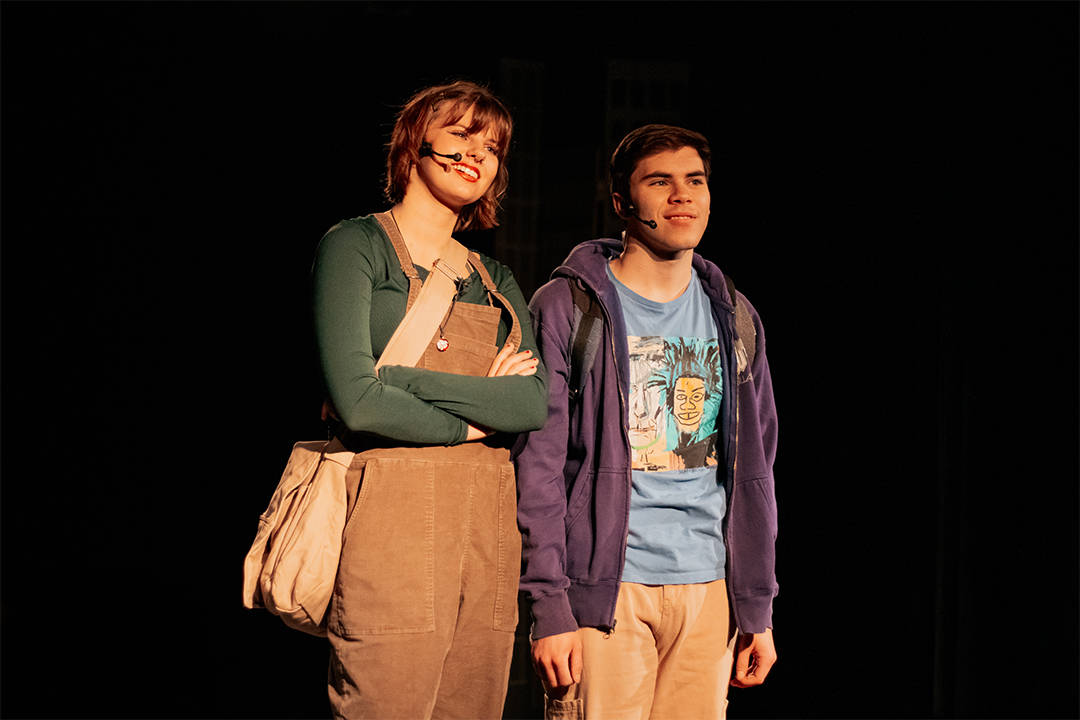Everyone’s got a big picture.
Or at least that’s what Deb (Lizzy White) tells us, convincingly, as one of the four young New Yorkers who served as the main characters in the St. Michael’s College Troubadours production of Ordinary Days. The musical, directed by Jenna Borden, was performed from January 18–20 at Palmerston Library Theatre, in a minimalistic set design of a few cardboard skyscraper buildings by set designer Chris Benny Paul. Despite the modest set design, the combination of Adam Gwon’s music and lyrics and the eight-person cast’s tight, effervescent performance on opening night made me entirely forget the bareness of the stage.
Deb’s persuasion that everyone has a big picture was the recurring message that Ordinary Days attempted to make resonate. The jovial musical is centred around the lives of Deb, Warren (Nicholas Spina), Jason (Jaxzen Sandell), and Claire (Jordan Davis), and we watch their ordinary days somehow interlock with each other to create a “big picture.”
The plot is nothing out of the ordinary; it could have ended up as a banal performance of trying to capture the struggles of any young person in a big city and packaging it as something extraordinary. However, the actors’ incredibly sensitive performance and the audience’s physical proximity to the stage created a surprisingly personal experience. The lack of barriers between the actors and powerful engagement with the audience made it feel like the actors weren’t singing strictly about their life stories: they became our stories. Magically, my ordinary day also intertwined with theirs. The pianist Jo O’Leary-Ponzo’s impeccable coordination with the actors elevated this experience.
As the main source of comic relief, Lizzy White as Deb was comically irritable but endearingly authentic. While Warren was an incorrigible optimist who pranced through crabby New Yorkers, Spina effectively brought out Warren’s sincerity and vulnerability. Sandell’s Jason started the performance off on a weaker note than they ended on; parts of the lyrics of their first song “The Space Between” were, at times, difficult to comprehend over the piano and their tone came across as more careful in contrast to its bolder, comical lyrics. By the end of the musical, however, they had exhibited a stronger connection to their role.
Jordan Davis as Claire was notably captivating. Her performances of “Let Things Go” and “I’ll Be Here” were pure bliss. While the rest of the performance of Ordinary Days drew the audience into the cast’s lives, Davis managed to push everyone out of her own world — a world in which she solitarily displayed extraordinary sensitivity in both loving and mourning.
There were times when the actors were way downstage in the otherwise perfect choreography: resulting in several audience members straining their necks to see what was happening. However, the musical was overall a feast to the eyes thanks to the absolutely hilarious performance and tight choreography of the four-person ensemble.
Erika Dowd, Kaitlin Cranston, Grace Li, and Hemali Ratnaweera were the reason behind the minimal set design, as they perfectly managed to play the roles of every single background character (and object) throughout the show. From the annoyed — and probably underpaid — barista at the café to the nicotine-addicted taxi driver to a sculpture at the Metropolitan Museum of Art to a literal giraffe, the ensemble breathed life into everything peripheral in the play and made the show all the more engaging.
Yes, New York City is becoming overrated. Yes, the story of young people navigating their lives in NYC is not original. And, yes, the cast of Ordinary Days probably knows that. But on a cold, sludgy winter night in Canada’s version of NYC, maybe all that 20-something-year-old students need to see are actors of our age reassuring us that our crushing existential crises and idealized big pictures are universal and, thus, ordinary. And maybe that’s why our ordinary days are beautiful — and worth romanticizing.



No comments to display.